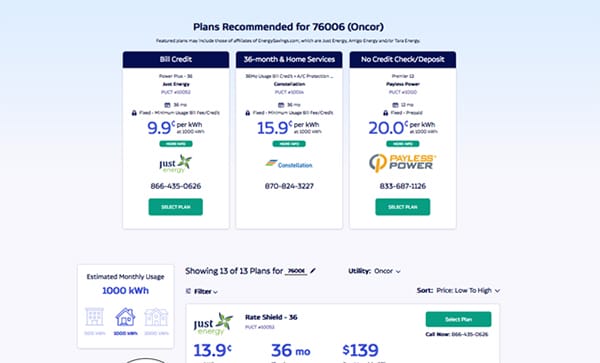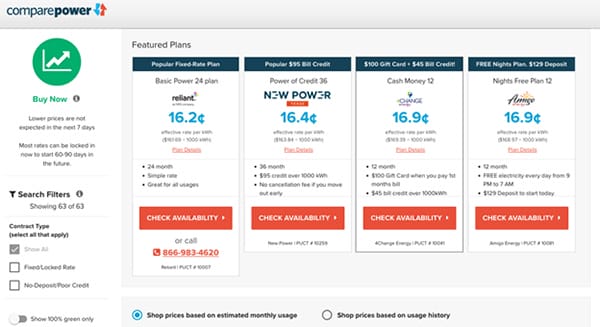
Texans looking for the best electricity plans may feel overwhelmed by the number of available energy deals.
Around 85% of Texas residents can change their electricity supplier thanks to the Lone Star State’s deregulated market. There are more than 140 retail electric providers (REPs) in Texas, each with dozens, scores, and even hundreds of products. No one has time to check them all individually.
EnergySavings.com is one of many price comparison websites that helps Texans filter rate plans. Compare Power is another online energy marketplace. But, just like choosing your electric service, how do you know which of these comparison companies is the best?
This EnergySavings.com vs. Compare Power guide will answer all those questions to help you, the consumer, find the most suitable electricity company for your energy usage needs. Discover if you can reduce your electric bills by switching suppliers.
EnergySavings.com vs. Compare Power in Texas: Why Switch Suppliers?
High electricity rates are pushing up energy bills right now. Texas electric companies are jostling to get their lower rates noticed by customers eager to bring down their electric bills.
Texas’ deregulated market allows most residents to switch their electricity suppliers should they choose. There are many electricity plans, from free electricity use on weekends to fixed-rate products. Fixed-rate plans are for people who want to know precisely what they will pay monthly for their electricity usage.
In short, there’s an excellent electricity plan for everyone, whatever your energy usage profile. Deregulation makes it straightforward to switch suppliers. But that’s not to say that finding the best deal is a walk in the park.
Behind every great deal are terms and conditions that may alter the price. Multiple price comparison websites help people find different deals but may only show some of the products. And ultimately, being a saver may be as simple as using less energy.
Some Texas residents cannot choose their energy supplier; people living in regulated service areas have their electric company selected by the Public Utility Commission of Texas (PUC or PUCT). For example, most of San Antonio is a regulated service area, and people get their electricity from CPS Energy.
EnergySavings.com vs. Compare Power: In Brief
EnergySavings.com and Compare Power are energy brokers registered with the Public Utility of Commission of Texas. That means they are intermediaries between electric companies and customers. Neither generates electricity or supplies electricity to buildings.
Instead, their specialty is publicizing energy costs from electric companies to make it easier for people to compare deals. Both make money from energy companies when people sign up for deals they’ve seen on their websites.
It’s not just about sales. The two companies have a holistic approach to energy, with regular publications about energy efficiency, energy-saving tips, and electric rates in Texas.
EnergySavings.com is very much an online company, whereas Compare Power has an online presence and offices for people to visit.
EnergySavings.com in brief
- Part of Interactive Energy Group
- Headquarters in Plano, Texas
- Specializes in Texas-related electricity plans, energy-efficiency measures, and news
- More than 20 years of experience in the Texas energy market
- Free to use
Compare Power in brief
- Headquartered in Dallas
- Has walk-in offices in Houston, Fort Worth, Irving, Austin, and The Woodlands
- Specializes in electricity for residents and businesses in Texas
- Operating in Texas since 2009
- Free to use
How to Best Use Price Comparison Websites
Finding a new energy supplier requires a little work and some knowledge before embarking. Here are the basics you’ll need to understand.
Texas electric rates are advertised in kilowatt-hours (kWh). Learn the amount of energy you use each month in kWh. Approximate per-month kWh usage figures are 500 (low), 1,000 (medium), and 2,000 (high).
Know the time of day — or night — you use electricity, and note whether it’s on weekends or weekdays. Electricity companies often have time-of-use deals covering peak hours and off-peak periods, like free electricity on weekends or at night.
Understand that minimum usage prices mean you must use that amount of electricity every month. Fail to do so, and you risk being charged for all your energy use at a higher rate.
A fixed-rate product lets people know their electricity bill based on usage. However, they’re not flexible, usually require deposits or credit checks, and often carry high early termination fees. Variable-rate offers are more flexible, often rolling from month to month and without deposits or credit checks.
Choose how much renewable energy you’d like, if any. Always read Electricity Facts Labels (EFLs) for hidden fees like deposits and utility fees not included in the advertised rate.
EnergySavings.com vs. Compare Power: The Similarities
Price comparison websites have some inevitable overlap in their search results and services.
EnergySavings.com and Compare Power are energy brokers that earn income from the companies whose products they advertise. They offer free-to-use websites that display, compare, and filter Texas energy rates.
Browsers comparing residential rates via their search tools will see a list of energy plans plus some recommended products. People can filter their search and easily compare estimated monthly bills based on the information provided. Results also show:
- The offer’s name with a brief description
- An estimated monthly bill based on the energy usage specified
- Recommended or highlighted plans
- Contract length
- Price in kilowatt-hours (kWh)
- Fixed or variable rate deals
- Any early termination fees
- Electricity Facts Label (EFL) with the contract’s details
- Links to consumer rights and terms of service
- Deposits required, if any
- Special conditions like time-of-use offers, bill credits, or minimum usage
Both websites’ search tools are excellent energy resources, publishing energy-efficiency advice articles and explaining Texas‘ deregulated energy market. Subjects covered include how to switch suppliers, electricity rates, and renewable energy. Their websites also contain information about Texas energy companies, utilities, power outages, and the Public Utility Commission of Texas.
However, using either site won’t improve your electricity supply’s reliability, reduce outages, or even guarantee to reduce your electricity bill. These companies only compare published energy rates, and neither offer natural gas products.
EnergySavings.com vs. Compare Power: The Differences
Users will notice differences in how the two companies operate.
EnergySavings.com has a more simple search tool. Customers input their ZIP code, with filtering happening after the first results are displayed. Conversely, Compare Power asks for a ZIP code and if users want “Help to choose” or to “see all plans.”
“Help to choose” leads to five questions, starting with whether the electricity is for a new home or a supplier switch. Next, if it’s for a house or an apartment and its energy usage (small/medium/high). Finally, whether people wish to have fixed-rate, variable-rate, or all deals, and whether they want a 100% renewable energy package. Interestingly, depending on your answers, users may see all the plans offered under “sell all plans” regardless.
Display-wise, there are slight differences. Compare Power adds a synopsis of each deal with pointers about what types of people could benefit from it. Compare Power also includes the amount of renewable energy.
The distinctions continue. Suppose you’ve found a deal on either website. EnergySavings.com directs you to sign up directly with the energy company and won’t collect any of your personal information.
Compare Power will ask for information from people because it completes switch and new-contract transactions through its website. Compare Power double-checks the availability for your address, requests switching dates, personal details, autopay options, and data for a credit check if required.
Business owners are advised to contact EnergySavings.com directly for business energy rates. Compare Power has a basic business search tool based on ZIP code, with owners also encouraged to get in direct contact.
Finally, EnergySavings.com offers an energy-related newsletter, which Compare doesn’t.
Let’s see the results of an EnergySavings.com vs. Compare Power search for electricity rates for residential customers.
EnergySavings.com vs. Compare Power: A Price Comparison
We searched for ZIP code 76006 (Arlington) on Dec. 3, 2022, for 1,000 kilowatt-hours (kWh) monthly usage. Note that the results below can change without prior notice.
Both businesses return recommended plans for the 76006 area, with brief offer descriptions and more products listed below. The companies highlight useful information like contract length, anticipated average monthly electricity bill, price per kWh, the energy company in question, and whether it’s a fixed-rate or variable-rate deal.
Comparison of Rates: EnergySavings.com
EnergySavings.com returned fewer options (16 vs. 63) but found cheaper rates with more varied contract lengths (six to 60 months vs. six to 36 months).
EnergySavings.com’s helpful filter includes the following:
- Minimum usage levels
- Alter monthly kWh amount
- Renewable energy additions
- Time-of-use choices like free electricity in the evening or on weekends
- Length of contract
- Fixed or variable rates
- Exploring by energy provider
There are search filter tips for people moving homes or those switching suppliers.

EnergySavings.com found the following for ZIP code 76006 (Arlington):
- Prices between 9.9 and 20 cents per kWh
- Contracts lasting six to 60 months
- Fixed-rate, minimum usage, and prepaid offers
- At least 16 different energy plans (13 listed, three recommended)
Comparison of Rates: Compare Power
Compare Power’s filter offers the same information with these differences:
- Four recommended deals instead of three
- No deposit or poor credit filter option
- Online or automated billing filters
- A brief product description and possible lifestyle suitability
Compare Power found the following for ZIP code 76006 (Arlington):
- Prices between 13.8 and 27.5 cents per kWh
- Contracts lasting six to 36 months
- Fixed-rate, minimum usage, and prepaid offers
- At least 63 different energy plans (63 listed with four of those as recommended)
Top tip: Always read every offer’s Electricity Facts Label (EFL) before signing anything. EFLs detail a contract’s terms and conditions.
Enter your ZIP Code and compare electricity rates
EnergySavings.com vs. Compare Power vs. Power to Choose
Price comparison websites are one of many ways to switch suppliers in Texas, from over the phone to in-person or online. PUCT’s official price comparison website, Power to Choose, is a good starting point for practicing searching for energy deals.
EnergySavings.com offers a portfolio of articles about how to use Power to Choose. Compare Power also has information on PUCT’s price comparison website, including blogs.
Price comparison websites like EnergySavings.com and Compare Power are generally more user-friendly than PUCT’s search tool.
More Information About EnergySavings.com vs. Compare Power
EnergySavings.com and Compare Power offer similar services within Texas’ deregulated energy market. However, a quick search produced varied results.
Do their energy resources also diverge?
EnergySavings.com vs. Compare Power: Who Has the Best Articles?
Honesty, transparency, and editorial independence are important to both price comparison websites.
Compare Power doesn’t have a dedicated blog. Instead, it has a learning center and an FAQs and answers section full of articles. Writers cover many Texas energy subjects, from switching suppliers to reading meters and saving on air conditioning energy usage.
EnergySavings.com has a dedicated blog covering everything from electric vehicles to energy-saving guides for thermostats, water heaters, and air conditioners. There’s valuable advice about energy-related financial incentives, grants, rebates, and an energy news section with insights and analysis of Texas electricity prices.
Both publish numbers, including Texas utilities contact numbers in case of outages, Texas electric company details, and contact information for the Public Utility Commission of Texas.
How to Contact EnergySavings.com and Compare Power
EnergySavings.com doesn’t sign up new customers who deal directly with energy companies. Its customer support team is available by email at support@EnergySavings.com. EnergySavings.com also has Facebook, Twitter, LinkedIn, and Instagram social media accounts.
Compare Power has several walk-in offices— Houston, Fort Worth, Irving, Austin, and The Woodlands — with individual customer service telephone numbers. Its website has a chat function and a customer support email at [email protected].
EnergySavings.com vs. Compare Power: The Conclusion
EnergySavings.com vs. Compare power is a tight one to call, with both businesses offering similar services within Texas’ deregulated electricity market.
The two publish excellent energy-saving and energy-efficiency advice. They add value to their brands with practical information about deregulation and the electricity switching services whose prices they advertise. Texas and electricity are their focal points.
EnergySavings.com found fewer plans for our search parameters but better value and more varied deals by price and contract length. Compare Power returned more products and delivered more search filter options. The primary user difference is that EnergySavings.com directs people to deal directly with energy companies, while Compare Power website is a one-stop shop.
EnergySavings.com prides itself on its unbiased information. Anyone considering switching suppliers through whichever website or shop should ask themselves these questions before signing any contract.




